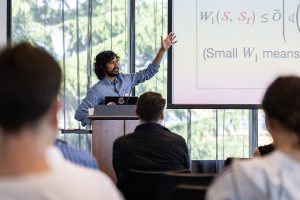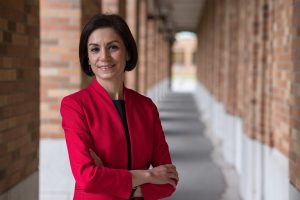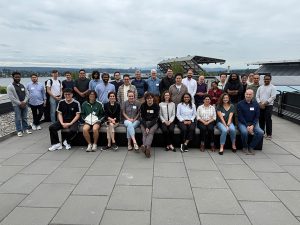By Wayne Gillam / UW ECE News

The Institute for Foundations of Data Science, led by UW ECE Professor Maryam Fazel, held the 2025 IFDS Workshop on Theoretical Foundations of Applied AI in August on the UW campus. The event brought AI and machine learning experts together from across the nation to discuss and explore the mathematical, statistical, and algorithmic underpinnings of modern AI systems — advancing theory in an effort to better understand and improve the trustworthiness, reliability, and robustness of AI technology. Shown above: Aaditya Ramdas, a professor from Carnegie Mellon University, giving a talk at the workshop. Photo by Ryan Hoover / UW ECE
Artificial intelligence has quickly become an indispensable part of modern life. Today, AI systems support search engines, streaming services, social media, and various online tools and products over a wide range of devices. AI also enables behind-the-scenes automation in a vast array of fields, including security, finance, transportation, and health care. With such widespread use taking place, it’s fair to say that the world is now in the early stages of running on and reaping the benefits of AI and related technologies.
But alongside these benefits, people are beginning to deal with serious problems and challenges that come with this powerful technology. For example, online misinformation and disinformation has long been a problem for societies around the world, and AI is turning up the volume on these issues by making it easy to produce fake information, images, and videos. It’s also been well-documented that algorithms underpinning AI can be biased in a multitude of different ways, skewing toward unfavorable or damaging outcomes. In addition, wide use of AI is raising new cybersecurity vulnerabilities and opportunities for hackers to up their game.
With all of the above in mind, the Institute for Foundations of Data Science brought AI and machine learning experts from across the nation to the UW to discuss and explore the mathematical, statistical, and algorithmic underpinnings of modern AI systems. The IFDS Workshop on Theoretical Foundations of Applied AI was held in August 2025 at the Bill & Melinda Gates Center for Computer Science & Engineering on the UW campus. This gathering of experts focused on discussing, exploring, and advancing theoretical understanding in an effort to improve the trustworthiness, reliability, and robustness of AI technology.

UW ECE Professor Maryam Fazel is an international leader in the study of artificial intelligence and machine learning. In addition to directing the Institute for Foundations of Data Science and co-organizing the IFDS workshop described in this article, Fazel organizes and speaks at other notable conferences, workshops, and events that bring researchers together worldwide, such as the 2025 International Conference on Machine Learning (see the ICML description and link below). Photo by Ryan Hoover / UW ECE
“The IFDS supports cross-collaborations between faculty and student researchers from many different departments at several universities. We have collaborative projects in progress as well as published papers and talks that tackle the challenges of modern AI,” said UW ECE Moorthy Family Professor Maryam Fazel, who is the director of the IFDS and was a co-organizer of the event. “This workshop provided another step in that direction. It brought people from different perspectives together and led to even more collaboration opportunities.”
Funded by the National Science Foundation, the IFDS is a partnership between the UW and the University of Wisconsin-Madison, the University of California Santa Cruz, and the University of Chicago. The mission of the Institute is to develop a principled approach to the analysis of complex, automated, decision-making algorithms and ever larger and potentially biased data sets that play an increasingly important role in industry, government, and academia.
“I’d like everyone to appreciate that this workshop was more than a series of lectures — it was a gathering of minds focused on making AI more principled, reliable, and understood,” said Kevin Jamieson, an associate professor in the Paul G. Allen School of Computer Science & Engineering, member of the IFDS leadership team, and co-organizer of the event. “This workshop reflects the IFDS’ deep commitment to pushing the boundaries of both foundational theory and real-world impact.”
Advancing theoretical understanding to improve AI systems

Participants in the 2025 IFDS Workshop on Theoretical Foundations of Applied AI at the Bill & Melinda Gates Center for Computer Science & Engineering on the UW campus. Photo provided by Professor Maryam Fazel.
The IFDS workshop brought together mathematicians, statisticians, computer scientists, and other AI and machine learning experts from across the country. One of the main topics speakers and attendees discussed was how algorithms that underpin AI learn from data and how that learning process could be better understood and improved. AI models used for a variety of applications, including large language models, such as ChatGPT, learn from data in multiple ways that are still not well understood by researchers.
For example, in addition to being trained on massive volumes of data acquired from the internet, large language models can also apply multi-step reasoning and in-context learning techniques to answer information requests and solve problems. These generative AI systems can be of great service to users when they work as intended. However, large language models sometimes generate false, misleading, or nonsensical information — occurrences that are called “machine hallucinations.” Why these hallucinations happen is too often a mystery to those who produce large language models as well as to data science experts.
“This workshop showcased how modern mathematical theory is evolving to explain and advance state-of-the-art AI methodologies, including large language models,” said Robert Nowak, a professor in the University of Wisconsin-Madison electrical and computer engineering department. “Advancing the mathematical foundations of AI is essential to eventually designing systems that are as trustworthy and robust as other complex engineered technologies, such as wireless networks and the internet.”
Other workshop topics included the role artificial neural networks play in AI systems, over-parameterization (where AI models have far more learning parameters than training data), how to make AI systems more robust to cyber-attacks and hacking, and reinforcement learning, especially as applied to robotics. Throughout the workshop, special attention was paid to highlighting connections between theory and practice.
UW ECE Professor Maryam Fazel was also a program co-chair for the 2025 International Conference on Machine Learning, which was held from July 13 to 19 in Vancouver, Canada. The ICML is the oldest, second-largest, and among the fastest-growing conferences of its kind in the world. Conference attendees examined and discussed topics such as privacy, safety, algorithmic biases, and intellectual property concerns. Much like the IFDS workshop described in this article, the ICML facilitated a process that built groundwork for solutions to some of the most urgent and complex problems in AI and machine learning today. Learn more.
Organizers of the event noted that this workshop provided a venue for researchers from different fields to discuss common issues with AI technologies and work on solutions together.
“The variety of perspectives on AI foundation models was very exciting to see,” said Zaid Harchaoui, a professor in the UW Department of Statistics, member of the IFDS leadership team, and co-organizer of the workshop. “The understanding of these models requires concepts and tools from mathematics, statistics, computer science, and information theory.”
Next steps for many of the faculty and student researchers in attendance will be to move the fresh knowledge, insights, and collaboration opportunities they gained through this event into their daily work. Fazel said that she will be applying several things she learned at the workshop in her own research. She also underscored the value a strong theoretical understanding can bring to improving AI performance.
“AI is developing rapidly. I think the pace is faster than any other technological development in the past. And, unfortunately, theory and understanding have fallen behind while the technology has continued to move forward,” Fazel said. “Addressing challenges and making improvements to AI models and methods requires us to gain a better and deeper understanding of how AI systems work. This understanding can then help us to solve the challenges and make AI technology more reliable, robust, and trustworthy.”
Abstracts and full videos of all talks from this workshop can be found on the event website. Information about related events and activities is available on the IFDS website. More information about UW ECE Professor Maryam Fazel is available on her bio page.

